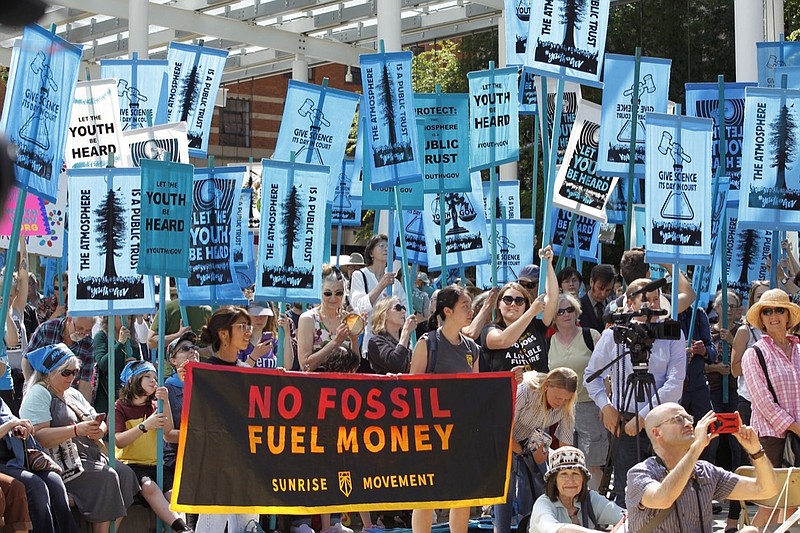"I believe that there is a change in weather and I think it changes both ways."
That was our president talking last week with British TV host Piers Morgan. Trump was relating a "great conversation" he had with Prince Charles about climate change. And in typical Trump fashion, he muddled meanings.
"It used to be called global warming, that wasn't working, then it was called climate change and now actually it is called extreme weather, because with extreme weather you can't miss."
No. No. No. No. No.
That's like saying Trump used to be called president and that wasn't working, then he was called Individual 1. Maybe someday he'll be called impeached. We digress.
On the serious side, at first blush we'd hoped the president finally understood that global warming - the long term warming of the planet since the early 20th century as a result of increased fossil fuel emissions accumulating in the atmosphere and enhancing the greenhouse effect - didn't just mean our weather would be hot all the time. We hoped he was grasping the idea that the effect, at least for a time, will be extremes - both hot and cold, floods and droughts.
But no. He was just mangling language.
According to NASA, the climate terms have not and are not being changed. They are all used, and they are all valid. Global warming is causing climate change in several ways, including increasing the frequency and severity of extreme weather.
The president also told the TV host that during the talk with Prince Charles, the royal tried to convince him of the world's climate dangers, but Trump said he pushed back at the suggestion that the U.S. should do more. (Remember, Trump pulled America out of the Paris Climate Agreement.)
"I did say, 'Well, the United States right now has among the cleanest climates there are based on all statistics.' And it's even getting better because I agree with that we want the best water, the cleanest water. It's crystal clean, has to be crystal clean clear," Trump told Morgan. The president blamed China, India and Russia for polluting the environment.
Fact: The United States is the world's second-largest carbon dioxide emitter, and our emissions are rising, up about 3.4% in 2018, according to findings published in January.
The very next month, Trump's White House created an ad hoc group of select federal scientists to reassess the government's analysis of climate science and to counter conclusions that the continued burning of fossil fuels is harming the planet.
Even as Trump was babbling in Britain, his new Environmental Protection Agency chief, Andrew Wheeler, was telling the National Press Club that the solution to climate change is simple: Just stop talking about it.
The ex-coal lobbyist who has pushed back on the consensus that human activity has negatively impacted the environment called on the media to stop riling up Americans about the worsening threat of climate change and to "fix" the impression that this administration is burying its head in the sand.
"The media does a disservice to the public by not informing the public of the progress this nation has made," Wheeler said Monday.
Here's the progress: Trump's administration and Republicans in Congress have relentlessly targeted environmental rules seen as burdensome to the fossil fuel industry and other big businesses. Of 84 rollbacks undertaken, 49 are completed and 35 planned rollbacks are in progress with an aggressive schedule to finalize many of them this year, according to research from Harvard Law School, Columbia Law School and The New York Times.
Speaking of both ways - or more accurately in this case, both sides - federal judges on Tuesday heard arguments about whether young people have a constitutional right to be protected by the government from climate change.
"In the lively, hour-long hearing, three judges from the Court of Appeals for the Ninth Circuit pushed skeptically on the arguments of both sides," The New York Times wrote.
The case, Juliana v. United States, could have important implications for this and other attempts to use the courts to pursue climate action across America.
The suit, filed by 21 young people in 2015 (and also resisted by the Obama administration), demands that the government step up to protect today's children and future generations from the worst effects of climate change. It says the youth risk being deprived of their "rights to life, liberty, property, and public trust resources by federal government acts that knowingly destroy, endanger, and impair the unalienable climate system that nature endows."
On Tuesday, the judges seemed to suggest the government's arguments in favor of shutting down the case were too narrow and the plaintiffs' legal theories were too sweeping, according to the Times.
The Washington Post characterized the judges as seeming "to wrestle" with whether the courts could make such sweeping demands of the government.
"Look, you're arguing for us to break new ground," one judge said to the children's attorney. "You may be right. I'm sympathetic to the problems you point out. But you shouldn't say this is just an ordinary suit ... . You're asking us to do a lot of new stuff, aren't you?"
"We're asking the court to apply bedrock constitutional law and principles to a wholly new set of facts," the attorney replied.
At least somebody gets it.
